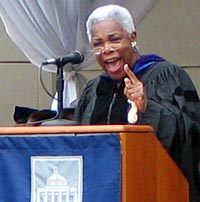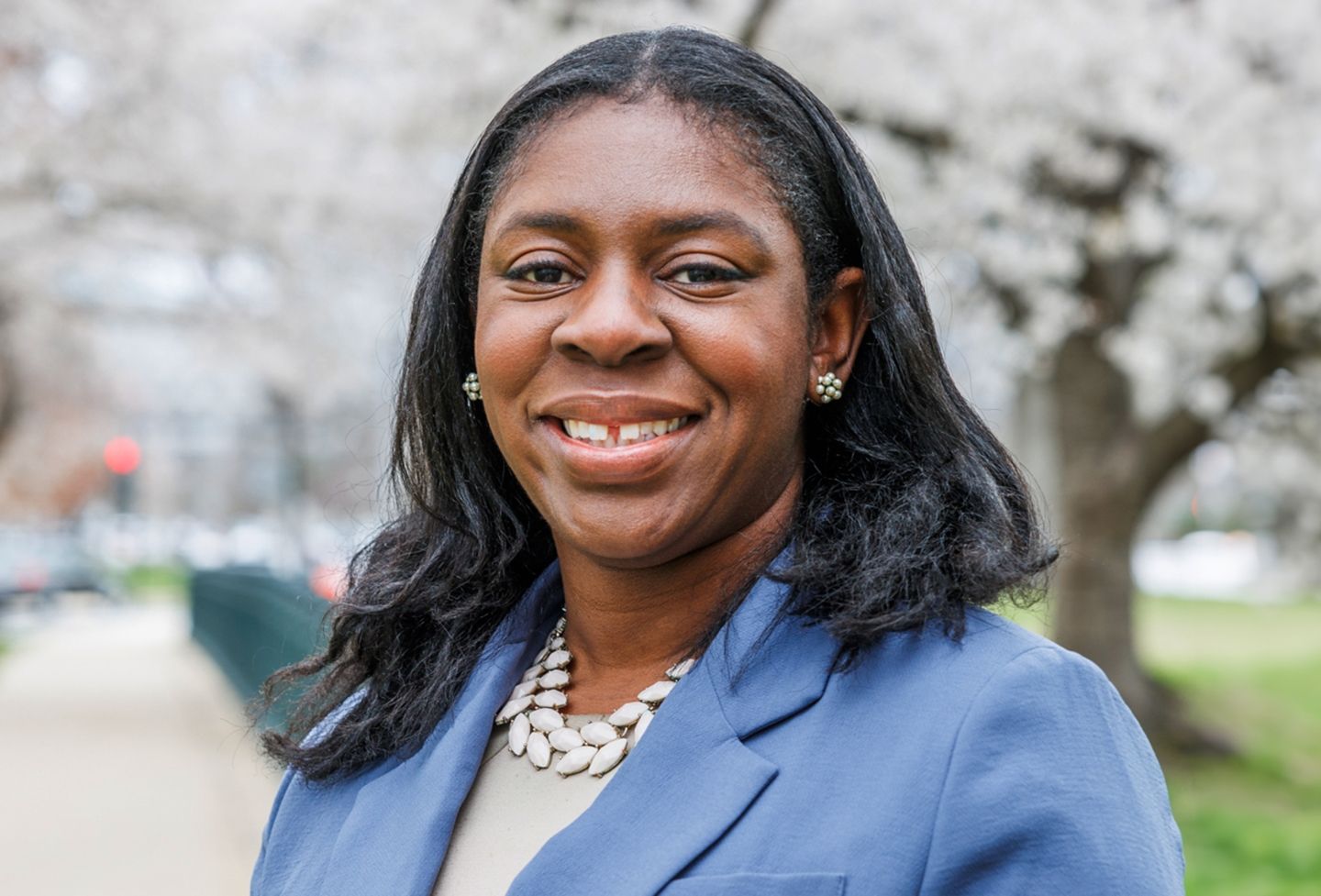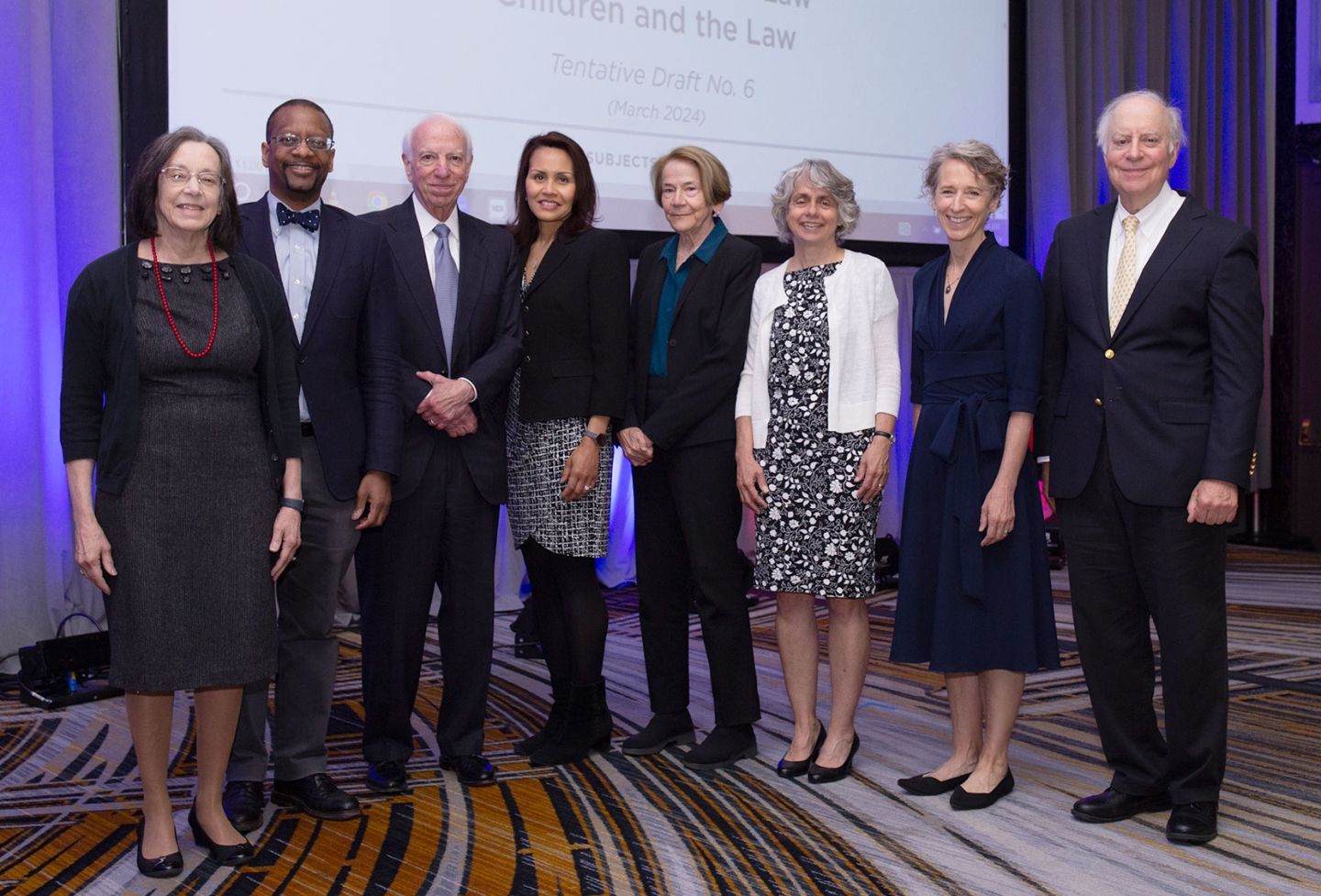Better Schools Needed to Fulfill Promise of Brown, Jones Tells Graduates
 Marking the 50th anniversary of the U.S. Supreme Court's Brown v. Board of Education decision, former head of the NAACP Legal Defense and Educational Fund Elaine Jones, a 1970 graduate of the Law School, told the members of the Class of 2004 gathered on Holcombe Green Lawn May 16 that they have a special reason to be proud of the school's contribution to the ruling, and a high moral example to uphold as well.
Marking the 50th anniversary of the U.S. Supreme Court's Brown v. Board of Education decision, former head of the NAACP Legal Defense and Educational Fund Elaine Jones, a 1970 graduate of the Law School, told the members of the Class of 2004 gathered on Holcombe Green Lawn May 16 that they have a special reason to be proud of the school's contribution to the ruling, and a high moral example to uphold as well.
Calling Brown "one of the greatest consolidated group of cases that the Supreme Court has ever decided," Jones told this year's graduates to reflect on the power of law to effect social change. "Lawyers did that, through law; a small group of lawyers strategically bringing cases across the country, deciding which issues to argue and when to argue them, deciding how to answer the questions they knew would come from the high court."
Ruling on cases from Virginia, South Carolina, Delaware, Kansas, and the District of Columbia, " Brown for the first time said that equal justice under the law included blacks as well," she said.
"What is it about Brown?" she continued. "In four of the five cases brought before the court the law had got it wrong and upheld the separate but equal law. But there was one court below where the judge got it right and it was a brave, brave thing he did… In a 1952 Delaware case, Collins J. Seitz, a University of Virginia Law School graduate, Class of 1940, got it right. Everybody else missed it."
Furthermore, she said, Seitz also got the remedy right: his decision called for "immediate" action to end segregated schools. But the Supreme Court, when it came back to the issue in 1955 to state a remedy, said states should use "all deliberate speed," which, Jones said, "was taken to mean 'take your time,' and that is what has happened. And to this day we do not have quality public education in all of our schools."
A moment of profound moral choice had come to Seitz, and Jones told graduates to expect to face such choices too. "Keep in mind: the time comes in the law when you must speak up," she said. "We don't have to seek that time. It will come to us. But we are going to be counted by what we do and what we say at that time.
"Collin Seitz called on lawyers to have moral courage. He made it clear that what enabled him to do what he did was the rigor of legal reasoning and the habits of mind that it engenders as pathways to the truth. He believed in the state of mind that welcomes to new ideas and formulations. He believed in a state of mind that does not raise barriers of intellectual self-contentment. He believed in the state of mind that does not fear the unorthodox. He got that training here."
Virginia's reaction to Brown — massive resistance, closing schools and thereby punishing children — is nothing to be proud of, she lamented, but Seitz's example is.
She quoted him as saying, "You will never be worth your salt if at sometime during your life you do not take up a worthwhile cause and fight for it."
Other issues will inspire today's graduates, such as the condition of the disabled or the aged or regional and ethnic issues, she said, but in any event, "do not keep silent in the face of injustice.
"One final point on this: it is important that we become culturally competent." Sixty-five major corporations filed briefs in the University of Michigan affirmative action cases last year to describe the sort of employees they seek, she pointed out. "They said, look, we are multinational corporations. As multinational corporations we need certain types of employees. We serve billions of people across the globe and we need a culturally competent employee who is better able to understand other perspectives… We don't have another 50 years to get it right," Jones urged.
Despite the revolution in American society that Brown wrought by catalyzing the Civil Rights Movement of the 1960s, its larger aim of a quality public education for all children remains to be achieved, Jones said.
America should spend enough money to give every child such schooling, she said. Meanwhile, society has put an undue priority on jailing nonviolent criminals. "We are spending thousands and thousands and thousands of dollars incarcerating folks who are not violent," she said. "California incarcerates…more people than Germany, Spain, France, Cuba, and the Netherlands combined. That's your issue. We pass the baton to you."
Drawing to her conclusion, Jones quoted a speech by Theodore Roosevelt in which he exalted those who put themselves personally into the arena of social change and ended by repeating her call for an urgent emphasis on school improvement. "Nothing is more important to the future of this democracy," she insisted.

The Law School conferred 358 Juris Doctor degrees, 37 Masters of Laws degrees, 29 Master of Laws in the Judicial Process degrees (to judges completing the Judges Program), and two S.J.D (Doctor of Juridical Science) degrees following Jones's remarks.
Law School Dean John C. Jeffries Jr. complimented the Class for being among the School's most stellar. "I've been here for 30 years and I have not seen your equal," he said. "You are the most committed, the most engaged, most active class in our long history," he said. "You have shown more leadership in organizations, projects, and activities than any class before you.
"The University of Virginia School of Law has never been a more vibrant, a more stimulating, a more fun place to study than when it was inhabited by the Class of 2004."
2004 Graduation Awards
Margaret G. Hyde Award
Allison Maria Orr
Founded in 1819, the University of Virginia School of Law is the second-oldest continuously operating law school in the nation. Consistently ranked among the top law schools, Virginia is a world-renowned training ground for distinguished lawyers and public servants, instilling in them a commitment to leadership, integrity and community service.


